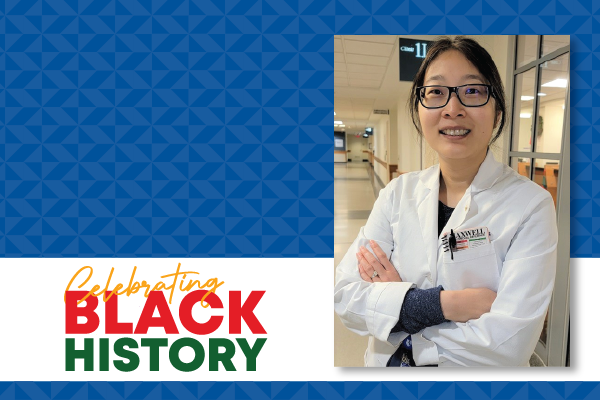
Duke Department of Medicine celebrates Black History Month with its Health Equity Series, which recognizes a few of our faculty, trainees and staff who are dedicated to improving health outcomes in the Black community.
When rheumatologist Dr. Kai Sun immigrated to the United States from China as a 12-year-old, the experience left an indelible impression. The path to social integration seemed steep with both a language barrier and being the new kid with few friends in her new Rochester, New York school.
For the first time, she felt different, like she didn’t fit in or belong—an outsider.
Dr. Sun never forgot that uncomfortable feeling, but the memory of the experience has come to serve her well, inspiring the Duke University Department of Medicine faculty member and Duke Lupus Clinic (DLC) researcher to focus on reducing racial disparities in medication nonadherence among patients with systemic lupus erythematosus (SLE, more commonly known as lupus), an autoimmune disease that disproportionately affects Black patients.
More than half of DLC patients identify as Black.
“In the US, the disparities in rheumatology are most pronounced in patients with lupus and the majority of patients with lupus are Black,” Sun said. “Lupus is a chronic, lifelong disease that requires long term treatment, but a lot of people don't take their medications regularly – particularly patients from racial minority groups. For complex reasons, Black patients are more likely to get lupus. They get worse lupus, and they're less likely to take their medications consistently. That's a bad combination.”
Medication nonadherence is a common but preventable cause of poor outcomes among lupus patients of color as well as other chronic diseases, giving Sun’s research significant translational potential that has generated great interest at the International Congress on Systemic Lupus Erythematosus and the American College of Rheumatology annual meetings and resulted in eight published first and senior author manuscripts with another three in production.
“The specific challenges may be different,” she said, “but this is a common theme applicable to every aspect of medicine.”
Contributions to Medical Science
At DLC Dr. Sun has cultivated a deeper understanding of the correlation between racial disparities and medication nonadherence. She has evaluated barriers and facilitators to medication adherence, implemented a process for DLC providers to review prescription refill data with patients as a means to improve adherence, and developed a survey for patients to easily identify reasons they may have difficulty taking their medications.
As a junior faculty member in 2018, Dr. Sun received a development award from the Duke REsearch to AdvanCe Healthcare (REACH) Equity Center to study disparities in medication nonadherence among lupus patients. The findings were eye-opening. About 30% of black patients were filling and reported taking their medications consistently while about 50% of white patients were doing so.
The adherence gap was especially large for the medication mycophenolate, which is a cornerstone drug used to treat severe manifestations of lupus. Using mixed methods, she aimed to better understand barriers and facilitators of medication adherence. Based on these data and input from lupus clinic patients and staff who are research collaborators, Dr. Sun piloted a provider-led adherence intervention that used pharmacy refill data for each patient combined with effective communication strategies and collaborative rather than judgmental language. The effort resulted in significant improvement in adherence.
With a subsequent Duke Clinical and Translational Science Institute KL2 Career Development Award, Dr. Sun performed additional in-depth evaluation of the intervention using audio recordings and in-depth interviews, and adapted the intervention for use in general rheumatology, expanding from the DLC. She recently received her first R01 to test this intervention within the broader Duke Rheumatology practice and Montefiore Hospital in NYC.
She also led the development and initial validation of a patient-reported outcome measure of the extent of and reasons for nonadherence called DOSE-Nonadherence-SLE, with the goals of improving both the quality and efficiency of patient-centered communication about adherence barriers.
“Doctors don't always realize that the patient has not been taking their medications, and the patients don't always volunteer that information, so this is a missed opportunity to talk about it,” she said.
Serving the Underserved
Dr. Sun gravitated to rheumatology early in her training so she could provide long-term, holistic care for patients. Her focus on medication adherence with underserved patients began in medical school at Washington University in St. Louis School of Medicine, including a gap year serving HIV patients in China.

“HIV patients in China still experience a lot of stigma, much more so than in Western countries,” she said. “It was an eye-opening experience to learn about the things those patients go through. I wanted to understand why people were not taking their HIV medications, and part of that was because of the stigma they experienced.”
Dr. Sun’s research interests came into focus during her rheumatology fellowship at Hospital for Special Surgery and concurrent master’s program in epidemiology and health services research at Weill Cornell Medicine Graduate School of Medical Sciences. She designed a study to examine factors associated with medicine nonadherence, enrolling 230 poorly-acculturated, immigrant rheumatology patients in New York City.
Developing relationships with them, she found, created a deeper understanding of their individual needs and helped in the management of complex disease. A shared experience of immigration and acculturation between patient and provider facilitated a level of trust that helped Sun learn more about patient experiences with medicine adherence.
Dr. Sun said she also learned that people from racial minority groups are less likely to take their medication, not just Chinese patients and immigrants, but Hispanics and Black patients as well.
The new R01 Award will build on her research momentum by allowing Dr. Sun to test a simple, low-cost intervention that combines a clinician and a patient component aimed to address critical gaps in the care of lupus patients. In her ongoing work, she will focus on improving and reducing the racial gap in patient-clinician communication and relationship as well as medication adherence.
“Clinicians across all types of medicine could stand to take a step back and think about their communication with patients,” she said. “That’s even more important when you're talking to someone from a different background. Patients need to both be and feel heard and I think medical training sometimes gloss over that.”